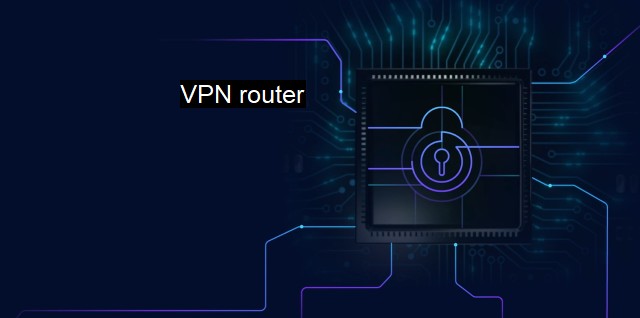What is VPN router?
Securing Your Connection: How VPN Routers Provide Enhanced Cybersecurity and Antivirus Protection
A VPN router is a type of networking device that routes network traffic, enabling users on a shared network to connect and communicate securely over the Internet. a VPN router plays a crucial role. It conceals your computer’s actual IP address, encrypting it within a protective layer preventing your online actions from being visible to others. It is highly efficient for businesses and individuals who are concerned about their online security and privacy.To truly understand its significance, we must first look at what VPN stands for. It alludes to 'Virtual Private Network.' A personal encrypted conduit through the widely insecure public internet is a key benefit of this technology. VPNs offer improved security, remote access, anonymity- when online, and protection from potential attacks.
VPNs provide encryption for the data flowing through the network. This encryption plays a vital role in protecting users' sensitive information by making it unreadable to unauthorized users who might be trying to intercept the data. Therefore, a VPN router is paramount in enhancing data protection, creating secure online environments, even on insecure networks like public Wifi.
Apart from this, VPN routers also provide anonymity, enabling a user's IP address to remain undisclosed to the rest of the online world. This prevents their browsing history from being tracked or manipulated, providing added security against online threats and breaches. It is critically beneficial in an era where cybercrimes are rampant, and personal information is excessively exploited.
The role of VPN routers extends into other areas of cybersecurity too; antivirus protection. A VPN may be deployed as a layer of protection against malware and hackers. Though a VPN router doesn't replace an antivirus, it can work hand-in-hand with it to provide strong security. Indeed, cutting-edge VPN technology usually integrates cybersecurity measures within their systems, including anti-malware, anti-phishing, and intrusion detection features. This kind of double protection helps safeguard against malicious programs, hacks, and breaches.
On top of that, VPN functionality can assist antivirus software through global data center connections. Some VPN services use secure server networks to offer an additional safety net by bouncing your connection across several servers and jurisdictions. This adds complexity to your connection path, making it tougher for cybercriminals to track and hijack it.
For organizations, a VPN router can enhance remote work security by adding another security layer for employees accessing the organization’s network remotely. VPN routers filter out unwanted traffic and hinder any unauthorized access to the business network, making it harder for cybercriminals to infiltrate the system or steal valuable information.
The ability of a VPN router to ‘tunnel’ through the Internet plays an essential role in preventing a direct attack on the user’s system. Once the data is sent from the user’s system, it is encrypted by the VPN before entering the public network. This additional security blanket makes cyber attacks far more difficult due to the anonymity and encryption provided by VPN services.
As cybersecurity threats continue to mount, it's increasingly essential to take steps to protect yourself. In both cybersecurity and anti-virus contexts, a VPN router is a crucial component of any robust cyber defence strategy. By obscuring the users' IP addresses, filtering undesired traffic, and encrypting data, a VPN router can significantly mitigate potential attacks, offering a critical layer of security. While it doesn't replace the need for firewall protection or antivirus software, a VPN router complements these tools, providing comprehensive security solutions for professionals and everyday web users. It is, without a doubt, a critical tool for navigating today's interconnected, digitally-dependent global landscape.

VPN router FAQs
What is a VPN router?
A VPN router is a device that allows you to connect multiple devices to a VPN (Virtual Private Network). The router is configured to direct all internet traffic through a VPN connection, ensuring that all devices connected to it are secure and protected. This can help protect your data and privacy, especially when using public Wi-Fi networks.How does a VPN router work?
A VPN router works by encrypting all internet traffic coming from your devices and then directing that traffic through a secure VPN tunnel. This creates a secure and private connection between your device and the internet. The VPN router acts as the gateway, establishing and maintaining the VPN connection.How do I set up a VPN router?
Setting up a VPN router requires installing the VPN client on the router itself and configuring the settings to route traffic through the VPN connection. This can vary depending on the brand and model of your router, but you can typically find step-by-step instructions from the VPN provider. It's also important to choose a VPN provider that supports VPN routers.Do I need a VPN router if I already have antivirus software?
While antivirus software can help protect your device from malware and viruses, it doesn't provide the same level of privacy and security as a VPN router. Antivirus software focuses on protecting your device, while a VPN router protects your entire network. A VPN router can also help bypass geographical restrictions, making it useful for streaming and accessing content from other countries.| | A | | | B | | | C | | | D | | | E | | | F | | | G | | | H | | | I | | | J | | | K | | | L | | | M | |
| | N | | | O | | | P | | | Q | | | R | | | S | | | T | | | U | | | V | | | W | | | X | | | Y | | | Z | |
| | 1 | | | 2 | | | 3 | | | 4 | | | 7 | | | 8 | | |||||||